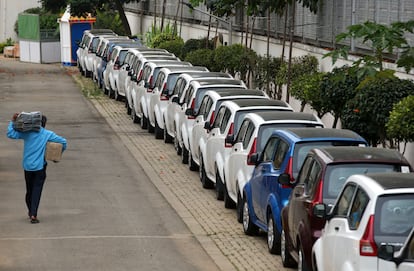Will the Global South become a dumping ground for gas cars or an EV hotbed?
A report by the Carbon Tracker research group shows electric transport could save over $100 billion annually in a dozen developing countries


Developing countries in the Global South face a crucial choice: remain dependent on fossil fuels or embrace electric vehicles (EV). While this transition comes with a cost, it also presents a significant opportunity. According to a report by the Carbon Tracker research group, around a dozen developing countries could save over $100 billion annually by leapfrogging to electric vehicles. These savings will come from lower oil imports and the development of domestic EV infrastructure and industries.
By 2035, the European Union, the United Kingdom, Canada, and seven U.S. states will begin banning cars with internal combustion engines (ICE), except for plug-in hybrids in the U.S. and Canada. These laws will give a major boost to the thriving EV industry and make a crucial step towards decarbonizing transportation. However, developing countries have not yet implemented similar measures. This poses a risk; the automobile industry in the Global North may continue selling ICE vehicles to the Global South for many years after the bans are enforced in their countries.
“Countries in the Global South risk getting trapped in dependence on fossil fuels, which could lead to a reliance on other nations for transportation fuels. These fuel imports result in substantial capital and foreign currency loss,” said Ben Scott, the author of the Carbon Tracker report.
The report analyzes 12 emerging economies — Brazil, Argentina, Mexico, India, Indonesia, South Africa, Uganda, Nigeria, Morocco, Kenya, Egypt, and Algeria. These countries have large numbers of ICE vehicles and spend billions every year importing transportation fuels. In many cases, they also lack the capacity to refine it, further worsening their trade balance. While Algeria and India are net exporters of refined petroleum products, these 12 countries as a whole imported $13.3 billion in transportation fuels in 2021.
The potential savings from new EVs could be significant. The report shows vehicles that are 100% electric (battery electric vehicle — BEV) have lower refueling costs compared to traditional ICE vehicles. This is because fuel must be purchased and transported, while electricity is less expensive, especially when it comes from renewable energy sources. “A fleet of electric cars can be charged using local renewable energy at a much lower cost than conventional refueling,” Scott said.
According to Carbon Tracker, transitioning ICE fleets to BEVs in the 12 countries could amount to about 50% in transportation cost savings, equivalent to over $100 billion annually. Moreover, this shift would generate new job opportunities in EV support industries like mineral extraction, manufacturing and infrastructure development.
A complex transition
The transition will not be easy. “Electric cars may not penetrate the Global South extensively due to limited new car sales. Used electric cars might stay in the Global North for recycling or repurposing. To address this, the Global South needs to implement eco-friendly policies favoring electric transportation and gradually begin phasing out combustion vehicles,” said Scott.
As electric vehicles become more prevalent in developed countries, the availability of combustion vehicles for export is likely to decrease. Consequently, the quality of available vehicles may decline while prices could rise. To align with the goals of the Paris Agreement (which aims to limit global temperature rise to 1.5ºC compared to pre-industrial levels), 64% of vehicle sales in 2030 should be EVs. However, current forecasts for major European automakers like Renault, Stellantis, Volkswagen and Mercedes indicate that EVs will only account for 40% of their vehicle sales in that timeframe.
In this context, Global South countries may become dumping grounds for ICE vehicles because automakers will want to sell them in places where it is still allowed after 2035. By developing local EV industries, these nations could forestall this scenario. “Countries in the Global South could partner with automakers in the north and China to tap into a vital and expanding market as populations in the region grow,” said Scott. “Localizing the production and assembly of electric vehicles in the Global South will lower costs and facilitate domestic sales in these markets.”
The report concludes that capitalizing on the technological advancements of battery electric vehicles presents several economic advantages for these nations. Notably, it would lead to reduced costs for consumers due to lower vehicle prices and operational expenses. Postponing the implementation of such policies could mean missing a valuable opportunity.
Sign up for our weekly newsletter to get more English-language news coverage from EL PAÍS USA Edition
Tu suscripción se está usando en otro dispositivo
¿Quieres añadir otro usuario a tu suscripción?
Si continúas leyendo en este dispositivo, no se podrá leer en el otro.
FlechaTu suscripción se está usando en otro dispositivo y solo puedes acceder a EL PAÍS desde un dispositivo a la vez.
Si quieres compartir tu cuenta, cambia tu suscripción a la modalidad Premium, así podrás añadir otro usuario. Cada uno accederá con su propia cuenta de email, lo que os permitirá personalizar vuestra experiencia en EL PAÍS.
¿Tienes una suscripción de empresa? Accede aquí para contratar más cuentas.
En el caso de no saber quién está usando tu cuenta, te recomendamos cambiar tu contraseña aquí.
Si decides continuar compartiendo tu cuenta, este mensaje se mostrará en tu dispositivo y en el de la otra persona que está usando tu cuenta de forma indefinida, afectando a tu experiencia de lectura. Puedes consultar aquí los términos y condiciones de la suscripción digital.








































